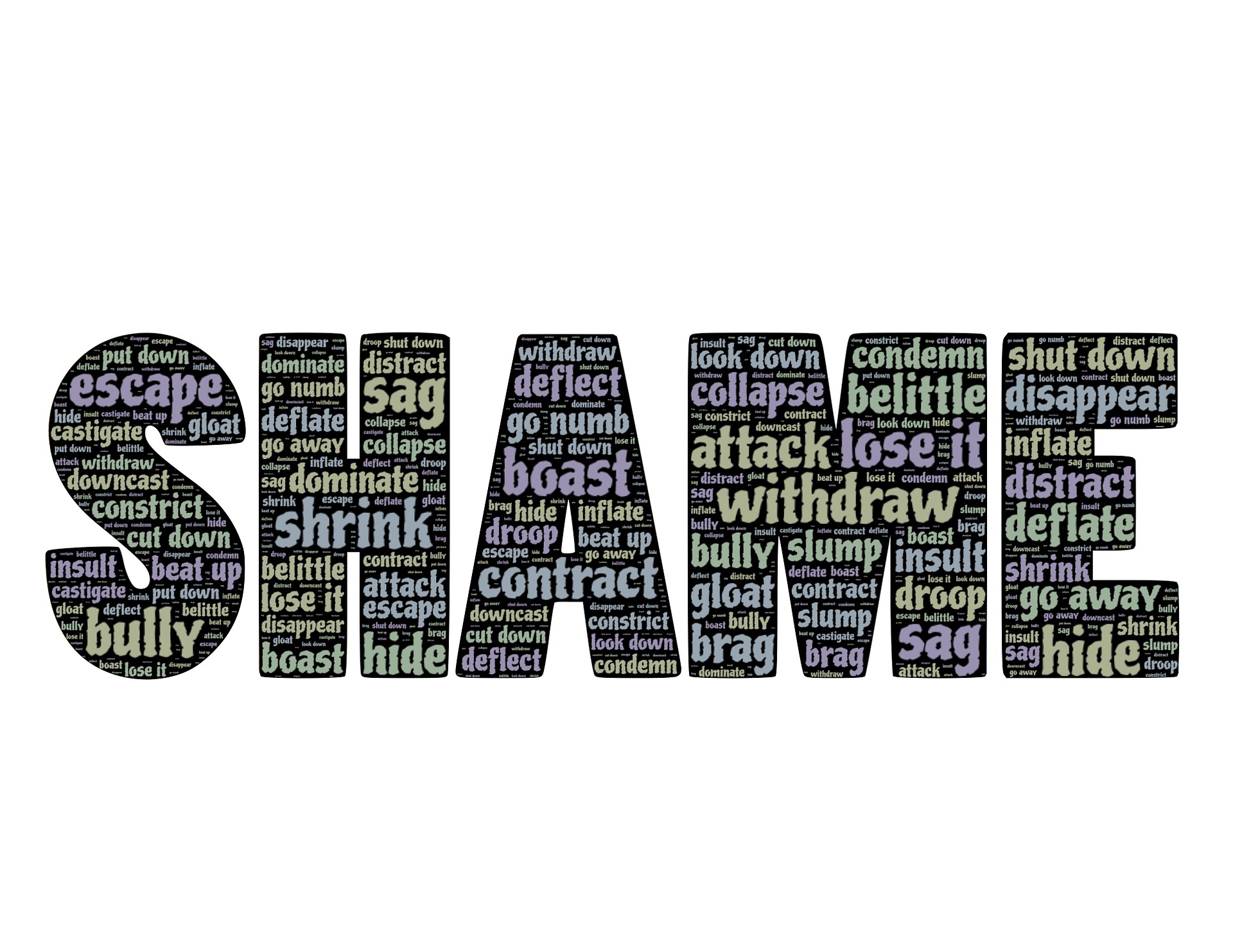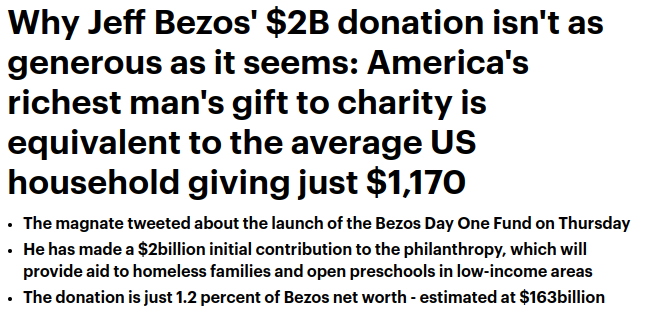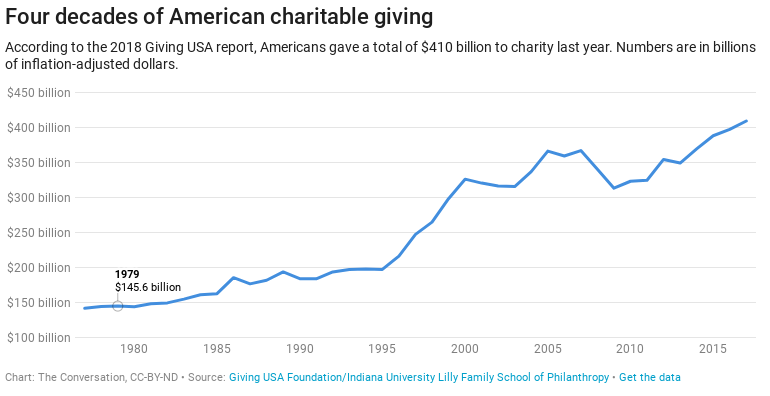Charity shaming: Why is there a shaming double standard?
In the wide world of shaming, there's a glaring double standard seeded deeply within personal finance discourse. It's called charity shaming.

In the wide world of shaming, there's a glaring double standard seeded deeply within personal finance discourse, and the target is charitable giving among the nation's high-income earners.
On one hand, most of us understand (and agree with) the notion that we should never shame people for the decisions that they make, because not only does shaming simply not work, but it puts people into a defensive posture. It's a negative emotion that only makes things worse.
For example:
- fat shaming people who are overweight
- frugal shaming those who might spend more money than we do
- car shaming those who drive old and beat up cars
- childless shaming for choosing not to have kids (we've seen this!)
With few exceptions, most of us flatly oppose the notion of shaming someone into changing their behavior. People's choices are nobody's business but their own. After all, it's their life. Their money.
And, we all come from different backgrounds and much of our decisions subconsciously stem from our past experiences. In other words, we aren't all alike, and it's insensitive and downright reckless to shame people based on their own perspectives and decisions. As a society, most of us are in the same boat, here.
With one weird exception...
When it comes to giving to charity, it seems to be open season. Those same shaming rules that we believe to be true suddenly disappear when we hear about high-income earners who don't give a lot to charity.
How dare they?!? They're filthy rich SOBs for making all that money and refusing to give to charity. They must be heartless bastards who don't prioritize helping other people. They are immoral. Maybe even jerkfaces.
Shame on them!
The charity shaming double standard
Several weeks ago, Twitter lit up with a mini firestorm with Amazon founder Jeff Bezos (and other super-rich folks) at the center. What was the hubbub about?
Here's just a microscopic subsection of tweets I extracted in just two minutes of my time after searching for Jeff Bezos Charity on Twitter.
I've withheld the Twitter profile names for obvious reasons...








There might be a fine line between shaming and just straight criticism. I don't know exactly where that line begins and ends, but it's easy to see that Bezos is being relentlessly shamed for his charitable habits.
From a percentage basis, many super-rich folks aren't giving all that much to charity. Apparently, even $2 billion isn't enough if you're Jeff Bezos:

And, according to the article, amassing a multi-billion dollar fortune is nothing short of a "profound failure of politics and morality".
Wow, I'm totally loving the rich shaming, too.
But if shaming is bad, or insensitive or downright abusive (as many of us rightly believe), why do we - on one hand - come out in droves in support of people's free-will choices to live and eat however they like - but on the other hand - easily and without hesitation ridicule and shame high-income earners for their charity habits?
Isn't shaming always bad? Or, is it okay in certain instances?
"But Steve, giving to charity is good! They deserve to be criticized because charity is a public good!"
Ah, so the end justifies the means, then. That's a mighty dangerous road you're trotting down, my friend.
What makes us believe that criticizing (or shaming) high-income earners is somehow a more righteous shame than criticizing those exact same people for the food that they choose to eat or lifestyle that they lead?
Americans are incredibly generous with their money. Last year, according to data from the Giving USA foundation, the American people donated over $400 billion dollars. That's billion, with a b.

But, keep in mind that being charitable comes in all sorts of flavors. Don't kid yourself into believing that it's just about the money.
Charity is more than just money
My college stats professor said something remarkable in front of the class on the very first day of the fall semester that I will never forget.
He said, flatly, "Statistics is the art of deception".
Numbers can be picked, massaged and tweaked to prove almost any conclusion, and while the math might be sound, the meaning behind those numbers very easily becomes a jumbled mess. Statisticians know this. So do economists.

Charitable giving is definitely no exception.
As any statistician knows, there's more to this equation than just money. When we look at statistics about the percentage of our income that we give, we're only looking at charity through a very narrow, confined lens.
Charity is about more than just forking over checks, and these statistics don't take into account other ways that people help those in need.
We see low charity numbers among those who earn a high-income and, from the comfort and security of our keyboards, instantly assume these people are selfish and greedy bastards because they could be giving more, but aren't.
But, charity comes in many different forms, like:
- Donating your time (soup kitchens, volunteering, etc)
- Donating your skills (using your expertise without payment)
- Donating your stuff (Good Will, anyone?)
- Helping out friends in need
- Real estate donations
- Giving blood
- Helping to raise funds
- Charitablethons (running or walking for a cause)
- Donating your credit card reward points or frequent flier miles
- Sell on eBay for charity
And, that's not all.
Did you know that Brian from Debt Discipline volunteers his time to improve financial literacy in his community?
Or, that Jillian from Montana Money Adventures works with International Justice Mission to make a hugely positive impact on the lives of kids who've been abused, neglected or improperly jailed?
Or Felicity's therapy dog, who brings a smile to the faces of those who need it the most? For the record, her dog is fluffy and adorable!
There are people out there making a huge difference.
But, none of that positive impact is reflected in those glorified numbers about charity designed for mass consumption. That's because it's only measuring a single thread in the larger woven fabric of charity.
There are a ton of ways to be charitable outside of forking over money.
Resist the temptation to make rash judgments based on monetary-giving alone. When statistics only track charitable giving from a monetary donation standpoint, it paints an unrealistic picture of the impact that people truly have in their local communities.
Don't fall prey to the statistics deception.
Shaming does not work
In general, shaming people is counter-productive (and I'm not just talking about Jeff Bezos, here...he doesn't care what you or I think anyway). This goes for anyone, almost any human being with a basic set of emotions.
"Shame makes people want to withdraw and hide," wrote The Conversation in an article about shaming people due to their lifestyle decisions.
While health-related shame matters to most people, its impact is even worse for those who are part of a stigmatised or marginalised group. These groups suffer from chronic shame about their identity, often related to matters such as poverty, race, sexuality or social class.
The fact is it's incredibly tough - or downright impossible, to shame people into doing something good -- like giving to charity. We might have the best of intentions, but more times than not, it just doesn't work. It clouds the discourse with negativity and we're not exactly making things any better.
"Shaming is a shock tactic that doesn’t serve to advance social causes. Just like people going naked in protest, it’s attention-grabbing, but not necessarily for all the right reasons," writes One Green Planet.
Certainly the world of social justice campaigning can’t just be full of quick fixes for hard solutions, but the majority of people seem to understand that. It’s more likely that we can feel as though we are drowning in a sea of the world’s problems, and in turn, want to do good and help nonprofits do good. We need to create social justice movements that inspire people to take action, that give people a sense of pride for doing their part. So don’t shame us, please, because we’re trying to make a difference, just like you.
Inspiring people to take action is demonstrably different than shaming them because of their past behavior. We think it's wrong to shame people who lead unhealthy lifestyles or live differently, right? Most of us do.
It's also wrong, then, to shame people for their charitable habits -- regardless of how much money they make.
The point
I am not here to defend or criticize anyone's charitable contributions.
Some of us will give a lot of money to charity while others won't. Some billionaires like Bill Gates will make a huge impact in our world while others, perhaps like Bezos, won't. And, some of us may choose other ways to give back within our communities outside of sending checks.
Personally, I don't know what Bezos does to give back. I don't know the guy.
Here's the larger point of this article: Let's stop this double standard.
If it's bad to shame others based on their lifestyle or money choices, then let's assume it's ALL bad and not feed the discourse.
I'm not in the business of shaming people for making free-will choices with their money, just like I would never shame someone for being overweight (after all, I used to be overweight as well).
I agree that shaming is bad news. Why can't we apply that same standard across the board instead of picking and choosing the people, organizations and causes that "deserve" to be shamed?
That sounds like a one-way street to Nowhereville.
Sorta like this:

P.S.: A shout out to Justin from Root Of Good who, over Twitter, gave me the motivation to write this post.